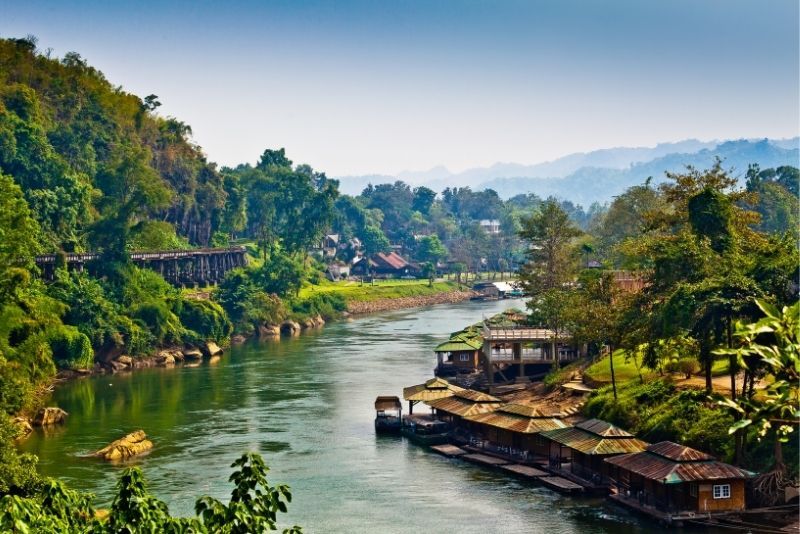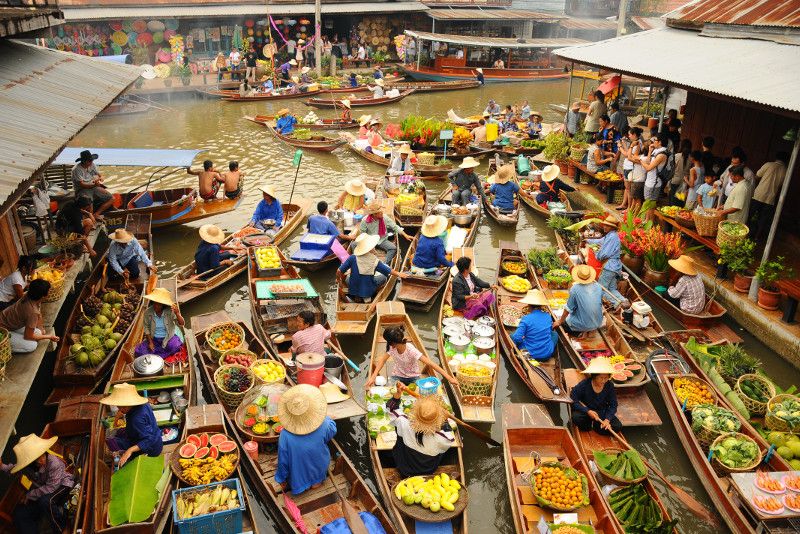
Thai-Burma Death Railway Bridge: Day Trips and Tours from Bangkok
Thai-Burma Death Railway Bridge: Day Trips and Tours from Bangkok
"The Bridge on the River Kwai" is more than just an acclaimed film, it is a real-life construction that cost the lives of thousands of prisoners of war. The bridge and the railroad across it were constructed in the 1940s under the order of the Japanese military during the Second World War and left a trail of destruction.
It is one of the most visited attractions outside of Bangkok, offering tourists a glimpse into Thailand’s past that is often neglected in historic recollections.
West of the Thai capital is a treasure trove of historic and cultural attractions and a day trip to the Thai-Burma Death Railway Bridge from Bangkok is the perfect way to escape the city and sink your teeth into the country’s past.

Here's all you need to know about the Thai-Burma Death Railway Bridge, one of the most exciting day trips from Bangkok.
How to get to the Thai-Burma Death Railway Bridge from Bangkok?
Your Thai-Burma Death Railway Bridge day trip will take you a little over 2 hours west of Bangkok, close to the Burmese border.
From Bangkok to Thai-Burma Death Railway Bridge by car
The Death Railway Museum is just over 120 kilometers from Bangkok central and the drive is manageable for a day trip. Drive along Route 338 out of the city for around 40 kilometers, then turn onto Route 4. Veer right onto Route 323 and follow the road right to the museum.
Guided tour to Thai-Burma Death Railway Bridge from Bangkok
Join a guided tour to the Thai-Burma Death Railway Bridge for a full-day historic adventure. These tours take away all the worry of planning an excursion and ensure that you see and do as much as possible. Tours depart early in the morning and can last 8 to 12 hours, depending on which activities are included in your tour.
What is the typical itinerary?
There are many itineraries to choose from for your Thai-Burma Death Railway Bridge day tour. Most tours start with hotel pickup from select locations before setting off on the 2-hour drive towards the railway museum.
First, you will visit the Kanchanaburi War Cemetery and JEATH War Museum to learn about the construction of the railway and the atrocities that unfolded here during the Second World War.
After learning the brutal history of the bridge, you will have a chance to see the bridge up close with a long-tail boat ride that goes under the bridge. The last adventure for the day is a ride on a local train to experience the rail system first-hand and take in showstopping views of the dense jungle and lush farmland of the region.
Longer tours first pay a visit to the Erawan Waterfalls where you can swim in emerald pools before visiting the Hellfire Pass to see another brutal remnant of Thailand’s wartime history. Other tours also visit the Damnoen Saduak Floating Market to showcase one of Thailand’s unique ways of life.
What kinds of tours are available to go to the Thai-Burma Death Railway Bridge?
There are plenty of tours to choose from when booking a Thai-Burma Death Railway Bridge day tour. Look at group sizes, itineraries and tour lengths to find your perfect excursion.
Guided tours to the Thai-Burma Death Railway Bridge from Bangkok
Guided group tours are an easy and convenient way to take on a Thai-Burma Death Railway Bridge excursion. There is a range of itineraries ranging from basic rail and history-focused tours to excursions offering you a more in-depth experience of Thai culture and nature.
Most tours include hotel transfers, museum entry fees and boat and train rides with the help of an expert guide.
Private tour to the Thai-Burma Death Railway Bridge from Bangkok
A private Thai-Burma Death Railway Bridge day trip is a luxurious way to visit the diverse region west of Bangkok.
Travel between the scattered attractions with ease, stopping at scenic points along the way to capture the unparalleled beauty of the Thai countryside. This is a seamless experience with hotel pick-up, lunch and activities all included.
There are also combo tour options adding a visit to the Elephant Haven, Damnoen Saduak Floating Market or Erewan Waterfall to your private Thai-Burma Death Railway Bridge day trip.

Day trip to Thai-Burma Death Railway Bridge plus Damnoen Saduak Floating Market from Bangkok
Venturing out to the west of Bangkok is an all-day affair, so make the most of your time on the road by visiting a few more attractions along the way. A popular addition to the Thai-Burma Death Railway Bridge day trip is the Damnoen Saduak floating market, giving you a glimpse into a bygone era.
The market is the most popular of its kind in Thailand and offers ample opportunity for pictures and to sample Thai food.
Day tour to Thai-Burma Death Railway Bridge plus Erawan Waterfall and Hellfire Pass from Bangkok
This is arguably the most comprehensive excursion to the Thai-Burma Death Railway Bridge, covering history, culture and nature in one fell swoop. Before visiting the historical landmarks around the Death Railway and embarking on a rail journey, you will swim in the turquoise pools of Erawan Waterfall.
After that, you will stop at another sobering remnant of WWII, the Hellfire Pass and its museum. You can take a small group tour or book a private experience for a more customizable itinerary.
How much does a day trip to the Thai-Burma Death Railway Bridge from Bangkok cost?
A standard day trip to the Thai-Burma Death Railway Bridge costs from US$60 per person. This includes hotel pickup and your train and boat tickets.
The Floating Market and waterfall visits along with your railway bridge experience cost US$90 per person. The basic private tours cost around US$150 per person, but the price depends on your group size.
What will you see and do?
A day tour to the Thai-Burma Death Railway Bridge takes you to several fascinating locations, delivering buckets full of adventure and cultural experiences. These are some of the remarkable things you can look forwards to:
Kanchanaburi War Cemetery

The prisoners of war that built the Thai-Burma railway died by the thousands under atrocious conditions during WWII. Kanchanaburi War Cemetery is the main cemetery where victims of Japanese imprisonment were laid to rest.
On your visit to Kanchanaburi, you will learn about the savage process of building the railway, gaining a newfound respect for the structure.
JEATH War Museum
This is one of the foremost museums to visit to learn about the whole history of the Thai-Burma railway. Various reconstructions will show you what life was like in 1940s Siam and you will see paintings, tools, weapons and photographs from the era.
Thai-Burma Railway train ride
On your Thai-Burma Death Railway Bridge day tour, you will take an hour-long journey on a local train. The train glides through the Thai countryside and past the lush jungle before making its way over the infamous bridge over the River Kwai.
Crossing the Wampo Viaduct is another special treat along the way, with unmatched scenery surrounding you from every angle.
Erawan Waterfall
A waterfall visit might seem out of place on a historically-focused day trip like this, but Erawan Waterfall is a distinct beauty not to be missed. The waterfall consists of seven cascading tiers, spouting water into calm turquoise pools.
You will be swimming deep in the jungle with only the sound of tumbling water and birdsong surrounding you.
Damnoen Saduak Floating Market

Floating markets are a way of life that is fast dying out in Thailand and the Damnoen Saduak Floating Market is one of the largest and last remaining. Pay a visit to the market to float among the vibrant vendors and see all manner of goods being sold off the back of boats.
Buy fresh tropical fruit or savor some local delicacies while you make your way through hundreds of stalls.
Hellfire Pass
This railway cutting served as a part of the Thai-Burma railroad, but its construction led to the death of almost 16,000 prisoners of war. Visit the eerie location and walk through the pass to see dedications to the victims of the war and construction.
There is also a small museum, exhibiting the story of the pass’s construction and the brutal fate of many prisoners.
When is the best time to visit the Thai-Burma Death Railway Bridge?
The best time to book a day trip to the Thai-Burma Death Railway Bridge from Bangkok is between November and February. These months have the most temperate weather and the least chance of wild rainstorms. Summer is much too hot, while the rainy season falls between July and October.
Travel tips
- You can pay extra for a guaranteed seat on the train, otherwise it is first-come-first-served seating.
- Inform your tour operator if you have any dietary restrictions, as some tours include lunch.
- Wear comfortable shoes and clothing. There is a moderate amount of walking involved and you must be able to comfortably climb in and out of the long-tail boat.
- Bring your swimsuit and towel if you are visiting the Erawan Waterfall.